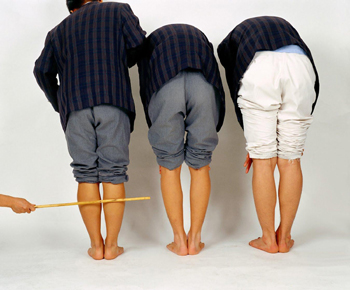
Seoul's elementary, middle, and high schools banned corporal punishment on November 1. Now, even light punishment can be corporal punishment. Because of this, the pros and cons of a total ban on corporal punishment have been raised.
In July, a video heated the Internet. It showed a student being slapped across the face and kicked by his school teacher when he wrote a letter of apology because of a fight with his friend. After the video was uploaded to the Internet, that teacher was dismissed from his post, and Kwak No-hyun, the superintendent of the Seoul Metropolitan Office of Education, banned corporal punishment in schools in Seoul from November. I think it is correct.
The most important thing is students’ human rights. Corporal punishment is effective in the short term, but finally it is possible to make dangerous results. The student who makes trouble just does the things that a teacher orders, instead of reflecting on and realizing his or her wrongdoings, because he or she doesn’t want to suffer corporal punishment. Real education has to give students chances to regret their wrongdoings and make up for their faults. However, corporal punishment makes students skip this process. If this situation continues, it is hard for students to establish proper values.
Around 120 countries prohibit corporal punishment in school. Among these countries, 24 countries, including Germany, Luxemburg, Sweden, and the United Kingdom, prohibit it in environments like school and youth detention centers. Recently, New Zealand banned all punishments. However, if a student disturbs class or his or her attitude is poor, the school imposes sanctions according to school rules. For example, students who often do not do their homework or make trouble have to take a class out of the class room or consult the principal. If it doesn’t solve these things, the parents come to the school and take the class with the students.
America bans corporal punishment in 27 states by law. In Michigan, a school gives guidelines on discipline to the students and their parents at the beginning of the school term. If a student commits a misdeed, the student receives supplementary lessons or light punishment or gets suspended from school. In Iowa, a student who acts up terribly receives emotional pressure by standing all class. In this respect, other countries make a good educational environment without corporal punishment.
The zeal for education in Korea is already ranked among advanced countries. Corporal punishment has to be banned to join the ranks of advanced countries in attitude and environment of education. Banning corporal punishment makes trouble in teaching students for a while. However, we have to deal with the problem of education without corporal punishment and try to suggest effective alternatives.
By An Da-som
KMG Reporter
ds0603@kmu.ac.kr
KMG Reporter
ds0603@kmu.ac.kr
Con
The Longman Dictionary definition of corporal punishment is “punishment that involves hitting someone, especially in schools and prisons.” Corporal punishment has an educational purpose. Proper and educational corporal punishment which lacks a teacher’s personal feelings is needed for student guidance. Therefore, I oppose the banning of corporal punishment.
First, teacher’s authority in class has been weakened. For example, last May 23, there was an incident in Seoul. Two elementary school students assaulted their teacher. If corporal punishment is completely forbidden, students will look down on the teacher’s authority in class. As a result, teachers will not be able to control classes and students. Teachers have to lead students to the right way. The status of teachers should not be weakened.
Second, now we don’t have effective alternatives to corporal punishment. If corporal punishment disappears, we can substitute other ways like parent consultations and expulsion from school. However, these days, there are many working couples. In reality, consultation with parents is difficult to introduce. Furthermore, the people who oppose corporal punishment say student’s rights are important. However, I think expelling a student is worse than corporal punishment. Expelling a student is no different from giving up on the student.
Third, human beings live in communities. School is also a community. If corporal punishment is not done in school, teachers will have much difficulty controlling students, and education will be in chaos. In schools, teachers have the obligation to educate students. If there is no proper sanction like corporal punishment for students causing problems, other students may be damaged.
Corporal punishment was banned on November 1. However, side effects occurred in the classroom from the first day. Some students were late for school, used rough words to their teachers, and intentionally didn’t attend classes. Some students even interfered with the classes, according to Dailian News. By prohibiting corporal punishment, it is true that the human rights of students are more protected. However, the alternatives don’t seem to have much power over students. We should rethink prohibiting corporal punishment.
By Park Ji-hyun
KMG Junior Reporter
qmsl3500@kmu.ac.kr
KMG Junior Reporter
qmsl3500@kmu.ac.kr








